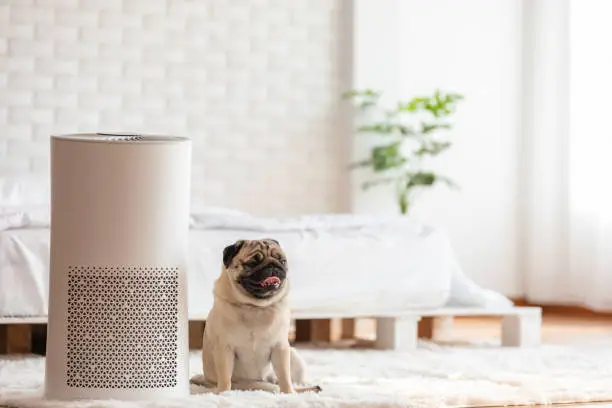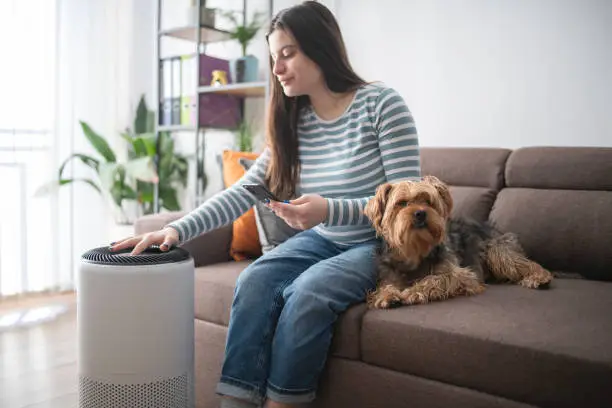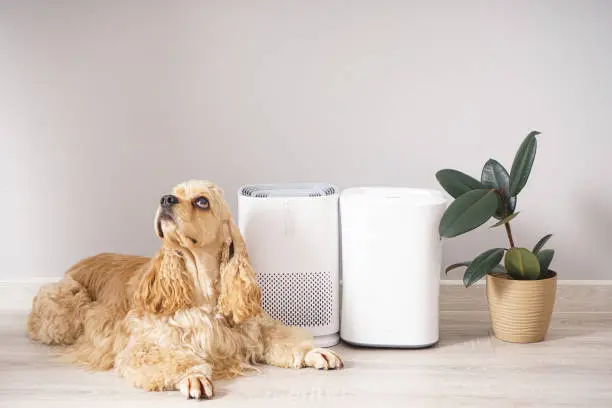Pets are valuable member of our house, and we love them purely. They bring happiness in our life, but their existence can have negative impact on health of humans as they carry some viruses or bacteria that are harmful for well being. In this article, your question regarding maintaining healthy lifestyle will be answered.

What causes pet allergies?
The only time an allergic reaction occurs is when a person is exposed to proteins in the skin, saliva or urine of animals. Among several other allergic responses, this one may also be the result of pet allergy; nevertheless, the signs show that a person is tested with a pet dander. Symptoms include sneezing. Fever and wheezing. Most of the times allergies are caused by dogs and cats.
What is an Air Purifier?
An air purifier captures mold, allergies and other harmful substances in air. It takes in the air and then cleanses and retains pollutants before letting clear air into the environment. All purifiers are not same as different air purifier uses different technologies.
Are Air Purifiers Safe for Pets?
These are safe to use around dogs if it is placed in a way that it is secure and there is no risk of falling over them. It can also help them as much it is beneficial for you.
Do Air Purifiers Really Work?
This is the common questions that comes to your mind when thinking about air purifier. It is evidence based that air purifiers lessen the allergens in the air. It is important to keep in mind that they are more effective when used with other combinations like vacuuming, cleaning and washing the rooms. But still, you can get allergies and that’s where air purifiers provide their best service.

Why pet Owners Should Use an Air Purifier
Are you still confused why to use air purifiers? Here is the answer:
It Provides Pet Allergy Relief
Pets are source of love and stress reduction to our homes. Pets especially dogs produce dander that is the reason behind triggering the allergy in human beings who are sensitive. Dogs that roam outside home may also bring other germs and dirt.
Dander does not just stay in the air. It attaches to everything in your home such as couches, air ducts and beds. For this reason, air purifier is the best choice to tackle with these harmful particles.
It Removes Toxic Chemicals in the Air
The impure compounds that evaporate from the products such as paint and alcohol when inhaled can have detrimental effects on the health of humans and pets as well. Volatile organic compounds can cause kidney and liver problems, and air purifiers help to clean the air form these harmful substances. Specific air purifiers are needed to filter the pollutants from the environment.
Air Purifiers Clean the Indoor Environment
Research suggests that air inside the house is five times more pollutant than air outside home so, your house may seem clean, but it contains many pollutants. Research studies indicated that the polluted particles present in air may result heart attack in digs and can be fatal. Pets who remain in such environment may develop tumours.

Air purifiers reduce the harmful substances in air which increase the chances of good well being of a pet. With carbon fitted filters air purifiers remove the smell absorbed by carpets and sofa. It gives your home fresh clean smell.
Which air purifier works best for pet allergies?
Air purifiers having high allergen cards are best choice to use in the treatment of pet allergy. Room size should be taken into account when buying an air purifier as each purifier has its own coverage area. The most effective ones are with HEPA filters.
The Brondell Revive True HEPA Air Purifier and Humidifier has dual True HEPA filters, which remove 99.97% of particles and allergens larger than 0.3 microns. Its dual suction and dual True HEPA filters mean this machine is working double time for you, creating and maintaining a consistent level of humidity. This air purifier is effective at cleaning air in spaces of up to 376.5 sq. ft when used for allergy sufferers.
The HealthMate Junior HM200 HEPA Air Purifier by Austin also works well in smaller residential spaces. This air purifier’s 360-degree intake system pulls air into all sides of the device, passing it through a four-stage filter. This results in more clean air delivered, quickly and efficiently. The HealthMate Junior HM200 HEPA Air Purifer’s filter comes with a five-year prorated guarantee, so you won’t have to worry about frequent filter changes with this device.
Every air filters have its own unique features they are not created equally. Each filter has its own merits and demerits when it removes allergens from the atmosphere. Some have better ability to remove allergens than others.
Alternative ways to reduce pet allergens in your home
If you wish to reduce pet allergens in your home you can try the following things, aside from using an air purifier you can do thorough household cleaning is an essential element of keeping your home free from pet dander or other allergens:
- Get rid of pet hair regularly by vacuuming the entire house and cleaning the furniture and floors by wiping them with a damp mop.
- Put pet beds in the washing machine and have them washed in hot water. The fact that hot water can eliminate dust mites, which are ascendingly common allergens pets keep in places, seems to be very true is evidenced in the fact that most pet-owning households have dust mites as their most common indoor allergen.
- Install hard surfaces or use a strong vacuum cleaner on area rugs and carpets, which could not be removed or replaced carpets with. Carpets absorb allergen particles and fibers, this is why the germs multiply. By replacing them you will eliminate these allergens from your home permanently.
Wash bedding regularly
- Wash sheets and pillowcases weekly and blankets occasionally.
- Use a detergent that is safe for pets to soak them in, then put them in hot water before drying on high heat, this will surely kill and residual allergens.
Replace carpeting with hard flooring
Becoming an outfit with hard surfaces may be one of the most suitable decisions to pet owners, who want to keep the allergens that cause the itchy eyes and noses to the point of emission distant from the environment they live in. The main culprits for allergens are dust mites and dander that might cause or intensify the allergic reaction between the air molecules and the organism when airways are irritated.
It being made of hard material, floor surfaces like tiles or PVC can be easily cleaned and are not as affected by disease-causing dirt and bacteria, which are commonplace in wet areas. It is highly conceivable that air purifiers can reduce allergens in your house, but they are not the sole solution for people with allergies. If you love birds but your housemate or partner has allergies and asthma, then you can reduce the risk of affecting the other one such as: who enjoys to be with the birds but is no air pollution source to his mate who suffers from allergies.
Wash your pet weekly – or ask someone else to do it for you!
Weekly pet baths are advised – or someone else can do the onerous task of it! It is easy for you to believe that you are taking care of your pet properly if you wash it, but it is not necessary for that. Moreover, the claim is not biased. To say nothing of the importance of vaccination for protection, it is the first and the most effective preventive measure in case of allergies. This is like saying, “If your pet gets dirt on that you don’t clean them regularly,” cargo carriers or crates can also spread mites. We advise you to use diatomaceous earth as per the instructions on the pack to control mites and keep fleas at bay. And, as mentioned earlier, even if you every now and then wash your dog and cat (a practice that we are not encouraging) there still are allergens remaining on them which might bring an allergic reaction to you.
Weekly pet bedding wash! Pet hair is literally everywhere: on the floor, walls, and the furniture; in the carpet; even inside clothing and furniture items. It is almost impossible to vacuum all places several times a day, so even dust and allergens might escape. Even if you are constantly and almost exclusively loyal to your vacuum cleaner, it still is possible for some persisting allergens to remain. Washing beddings on a regular basis will lead to less shedding so that when one passes through a room, they get a breath of fresh air without getting an allergic reaction whenever they inhale the animal dander springing up overhead as the tiny microfibers have practically coated the house with dust that is attracting static electricity like a charge from the window of an early morning bed during the allergy season.”
Conclusion
The liver health of a dog can be supported by a suitable diet, which in turn affects its general well-being. Utilizing lean proteins, fiber-rich vegetables, and antioxidant-rich fruits will facilitate the liver to get repaired and to function well. Consult a veterinarian to have proper drug administration. Just like humans, dogs are different from each other, so you first must figure out your specific needs or the one that has to be treated first and then the diet that helps support the liver resolves that.
FAQs
1. Can air purifiers completely eliminate pet allergens?
Air purifiers are effective in reducing pet allergens in the air but may not remove all allergens entirely. They work best when combined with regular cleaning practices like vacuuming and washing bedding to help manage allergy symptoms.
2. Are air purifiers safe for pets?
Yes, air purifiers are generally safe for pets as long as they are securely placed and maintained. In fact, they can benefit pets by improving air quality, which can be especially helpful for pets with respiratory issues.
